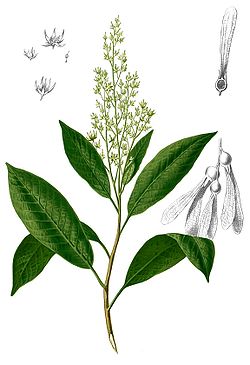| Anisoptera thurifera | |
|---|---|
 | |
| Scientific classification | |
| Kingdom: | Plantae |
| Clade: | Tracheophytes |
| Clade: | Angiosperms |
| Clade: | Eudicots |
| Clade: | Rosids |
| Order: | Malvales |
| Family: | Dipterocarpaceae |
| Genus: | Anisoptera |
| Species: | A. thurifera |
| Binomial name | |
| Anisoptera thurifera | |
| Synonyms [2] | |
List
| |
Anisoptera thurifera [3] is a tree species in the family Dipterocarpaceae. [2] This Asian species has been recorded from Bangladesh through to New Guinea; [3] [4] the IUCN has categorised it as Vulnerable.
